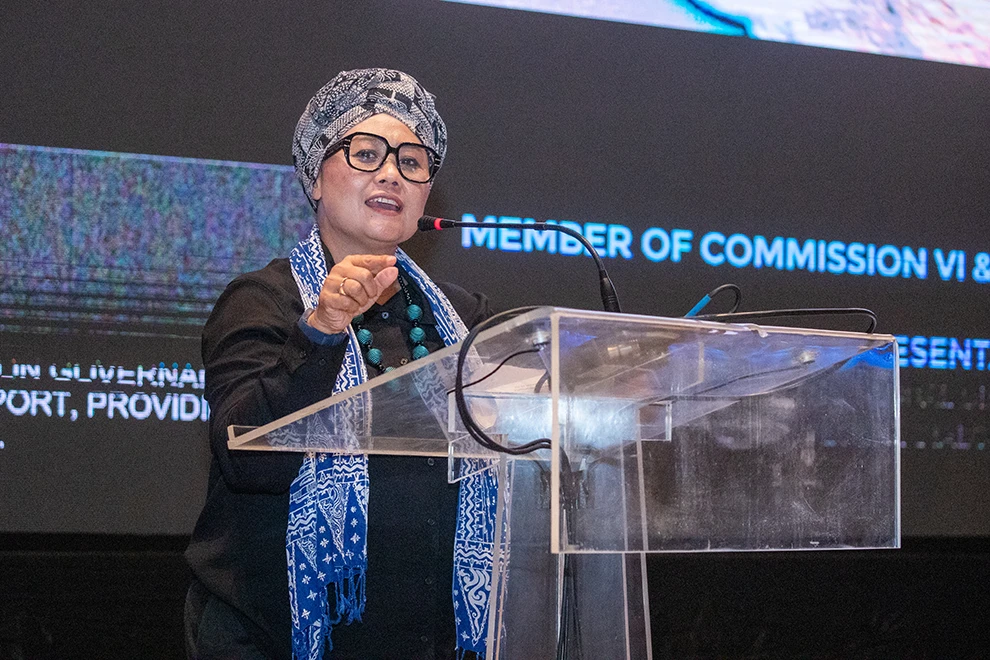Hon. Luluk Nur Hamidah, a prominent member of the Indonesia Ocean Caucus and the Indonesian parliament, delivered a keynote speech at the 5th Global Dialogue from the Global Ocean Accounts Partnership: Global Dialogue on Sustainable Ocean Development side event titled "Asia and the Pacific Regional Knowledge Exchange," underscoring Indonesia's dedication to sustainable ocean development. Moderated by Cheryl Joy Fernandez-Abila, this panel featured a series of insightful presentations from various regional stakeholders, providing a platform for sharing best practices, capacity building, and fostering partnerships.
In her address, Hon. Luluk highlighted several critical areas essential for sustainable ocean management:
Empowerment of Women in Ocean Conservation: Hon. Luluk emphasized the invaluable contributions of women in fisheries and marine conservation. She advocated for increased participation of women in decision-making processes, tailored education and training programs, and economic opportunities in the blue economy. Empowering women, she noted, enhances the overall sustainability of marine resources.
Sustainable Financing for Marine Protected Areas (MPAs): She stressed the importance of sustainable financing mechanisms for the establishment and maintenance of MPAs, vital for preserving marine biodiversity. Innovative funding models such as public-private partnerships, conservation trust funds, and international grants were proposed to ensure long-term financing.
Enhanced Data Collection and Access to Information: Hon. Luluk discussed the necessity of robust data and fisheries monitoring systems for effective fisheries management. She advocated for comprehensive data collection policies and improved collaboration between fisheries managers and research agencies to develop sustainable regulations.
Legislative Framework, Budget Allocation, and Policy Reform: She highlighted the need for a robust legislative framework to protect marine ecosystems and ensure sustainable use of ocean resources. This includes decentralizing fisheries management, empowering local authorities, and enforcing existing management plans and regulations.
Ecosystem Financial Incentives: Hon. Luluk underscored the role of Ecological Fiscal Transfers (EFTs) in balancing economic growth with environmental conservation. Properly managed EFTs can reward regions for their conservation efforts and encourage the expansion of ecological areas.
Community Engagement and International Collaboration: She called for active participation from all stakeholders, including local communities, businesses, and civil society, in sustainable ocean development. Hon. Luluk also emphasized the importance of international cooperation in addressing transboundary issues like illegal fishing and marine pollution.
Other presentation themes included:
- Strategies for Natural Resource Management and Ecosystem Services Valuation, by Kim Thị Thúy Ngọc, Head of Division of Science and International Cooperation, ISPONRE, Vietnam
- Academic Contributions to Ocean Accounts and Blue Economy Strategies, by Rico Ancog, Dean, School of Environmental Science and Management, UP Los Baños, Philippines
- Outcomes of Samoa’s National Workshop on Ocean Accounting, by Maria Satoa, Principal Marine Biodiversity Conservation Officer, MNRE, Samoa
- Reflections on Tonga’s Ocean Accounting Experiences, by Meliame Fusi Tu’alau, Principal Marine Environment Officer, Ministry of Infrastructure and Tourism, Tonga
- Lessons from Vanuatu’s National Ocean Policy and Marine Spatial Plan, by Jack Loughman, Country Manager, Blue Prosperity Vanuatu
- Vanuatu’s National Oceans Policy and Stakeholder Engagement, by Steve Hango Williams, Senior Desk Officer, Oceans Division, Department of Foreign Affairs and International Cooperation
The event concluded with an interactive discussion session, providing an opportunity for participants to engage in open dialogue, exchange ideas, and explore potential collaborations. ICCF commends the Global Ocean Accounts Partnership Secretariat for their excellent organization of this pivotal event, which fosters international cooperation and advances sustainable ocean development practices.

 Regional Headquarters
Regional Headquarters